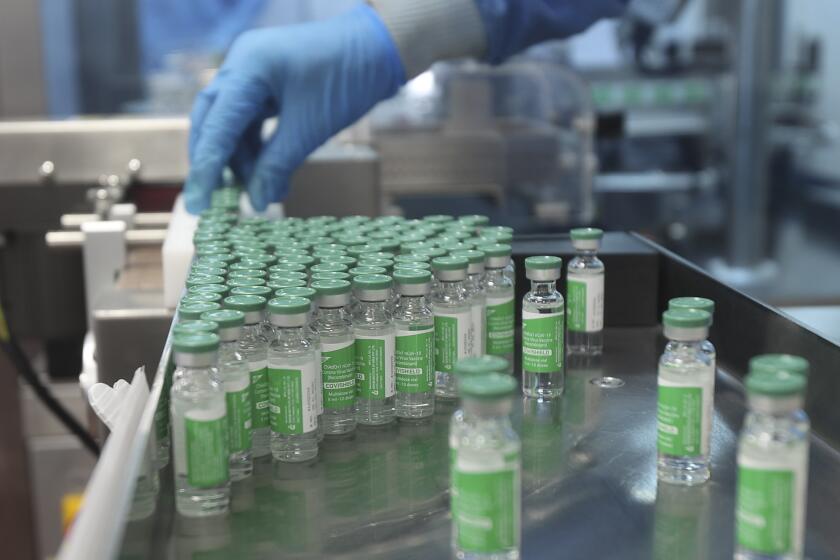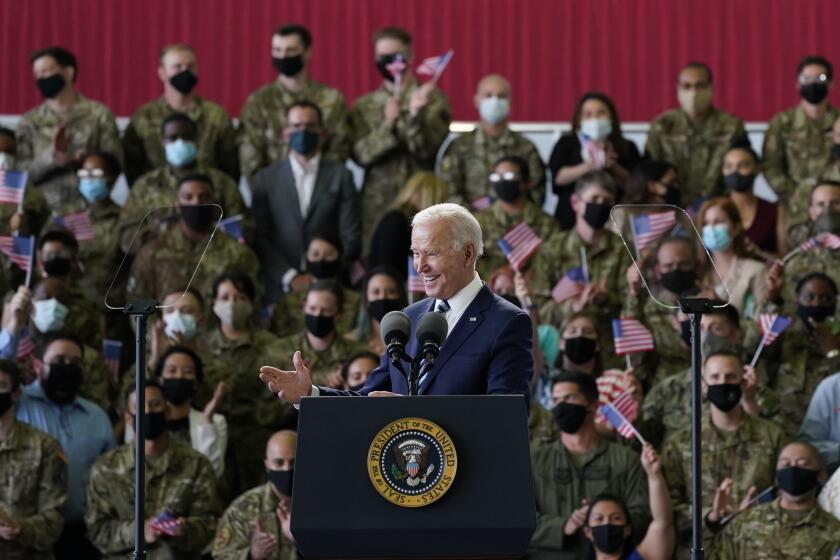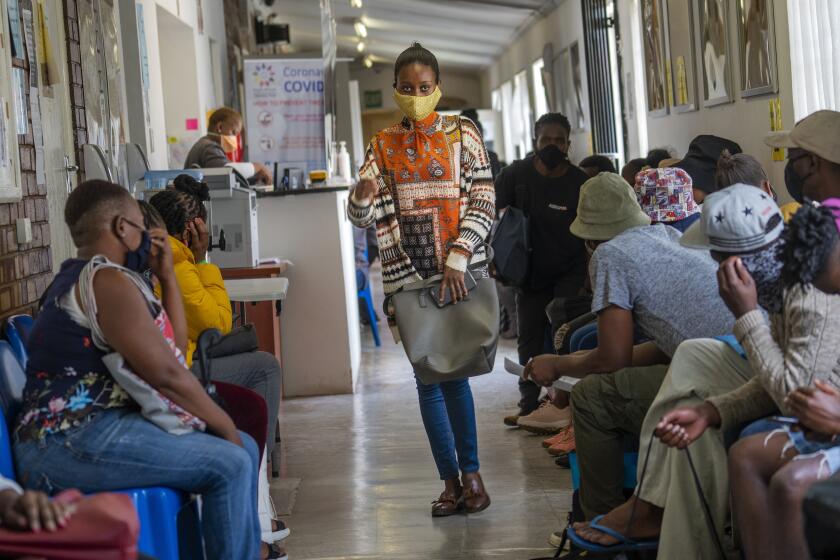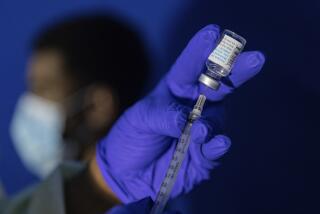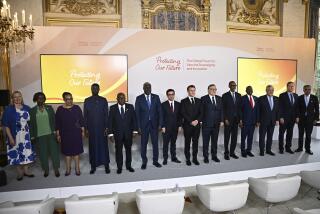Africa’s COVID-19 envoy blasts EU, COVAX over vaccine crisis
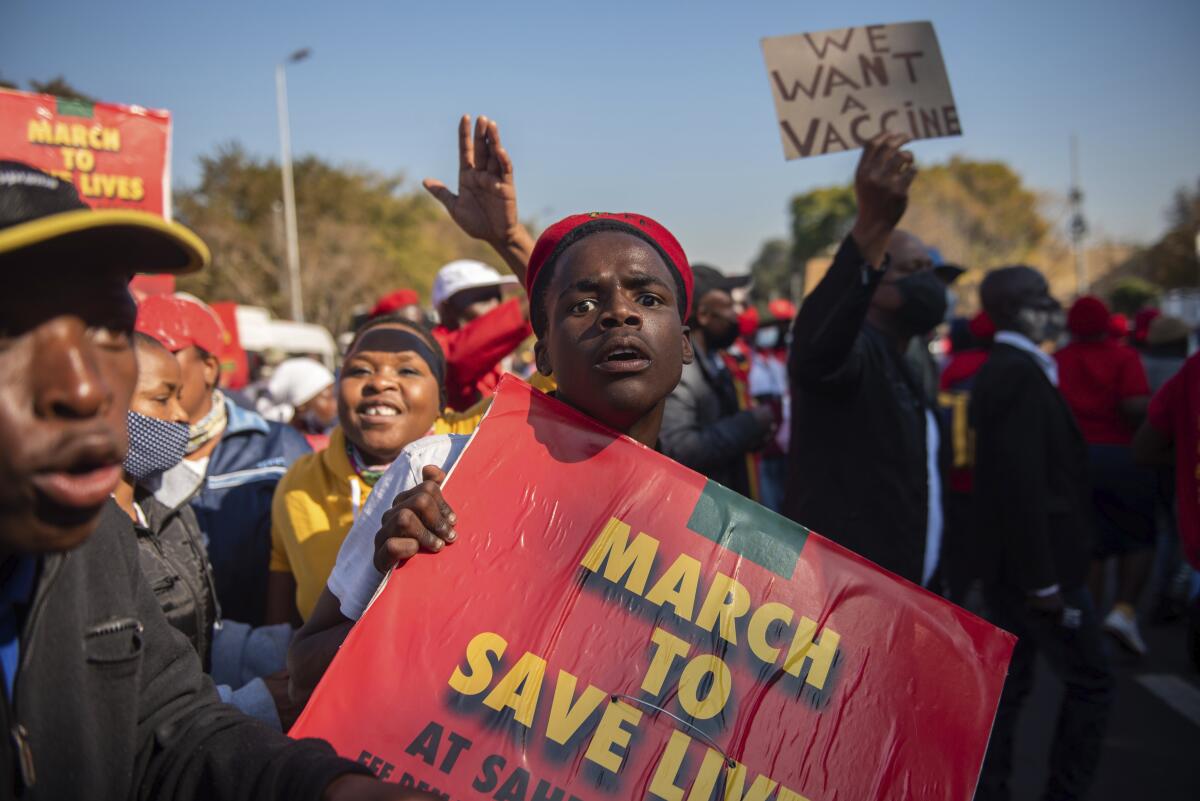
- Share via
NAIROBI, Kenya — The African Union special envoy tasked with leading efforts to procure COVID-19 vaccines for the continent is blasting Europe, saying Thursday that “not one dose, not one vial, has left a European factory for Africa” despite a crushing third surge of infections there.
Strive Masiyiwa also took aim at the global effort meant to distribute vaccines to low- and middle-income countries, accusing COVAX of withholding crucial information including that key donors hadn’t met funding pledges. He didn’t name which donors.
“The situation could be very different had we known back in December that ‘Listen, this help is not coming, do for yourselves,’” Masiyiwa told reporters, adding that “many countries were just sitting back saying, ‘The vaccines are coming.’ ... We as Africans are disappointed.”
The criticism revealed African leaders’ sheer exasperation at the world’s dramatic vaccine divide, with Masiyiwa describing vaccinated, unmasked Europeans attending football matches while just 1% of Africans are fully vaccinated against COVID-19. The continent has the lowest vaccine coverage in the world.
Masiyiwa stressed that Africa had purchased 400 million vaccine doses and could buy more, but he challenged donors: “Pay up your money. ... We will no longer measure pledges, we will measure vaccines arriving at our airports.”
The African continent of 1.3 billion people is now in the grip of a third surge of infections that is “extremely aggressive,” according to John Nkengasong, the head of the Africa Centers for Disease Control and Prevention. Health officials have described overflowing COVID-19 wards, dangerous oxygen shortages and a growing spread of the virus to extremely vulnerable and unequipped rural areas.
Masiyiwa said COVAX had promised to deliver 700 million vaccine doses to Africa by December. But at midyear, Africa has received just 65 million doses overall. Fewer than 50 million doses via COVAX have arrived.
“We are very far away from our target,” Nkengasong said. “We don’t want to be seen as the continent of COVID.”
Last year the World Health Organization launched a program that aimed to scale up production of COVID-19 vaccines in Latin America, Asia and Africa. Pfizer and Moderna refused to participate.
A spokeswoman for Gavi, the Vaccine Alliance, the public health group that manages the U.N.-backed COVAX, did not address Masiyiwa’s allegations. She said COVAX published a supply forecast “based on best available information,” and said the vaccine shortfall so far this year was because the major COVAX supplier, the Serum Institute of India, had diverted production for domestic use.
The World Health Organization in a separate briefing said COVID-19 case numbers were doubling in Africa every three weeks, and the highly contagious Delta variant was driving the new wave of infections.
The Lancet COVID-19 Commission African Task Force made an urgent appeal for at least 300 million vaccine doses so every African country could fully vaccinate at least 20% of its people by the end of August. It said 46% of the U.S. population was fully vaccinated, with about 33% in the European Union and about 40% in China.
Nkengasong and Masiyiwa did announce some vaccine progress, saying the first shipments of Johnson & Johnson and Pfizer doses based on U.S. support will begin arriving next week. It was not clear how many doses would be in the shipments.
Meanwhile, more African-purchased doses will arrive in August, Masiyiwa said.
Biden to announce at the start of the G-7 summit that the U.S. will donate enough Pfizer COVID-19 vaccine to inoculate 250 million in poor countries.
The African continent has had 5.5 million confirmed coronavirus infections and has seen a “remarkable” 23% increase in deaths over the past week, the Africa CDC director said.
He said the continent needed 1.6 billion doses in a double-dose regime, or 800 million for a single-dose regime, to meet the goal of vaccinating 60% of the population.
Masiyiwa gave a frank accounting of where global efforts to vaccinate the world against COVID-19 had sputtered. “It became pretty clear by December that the hope that we would all as a global community buy vaccines together through COVAX was not being adhered to, particularly by the rich and powerful nations,” he said.
COVAX aimed to provide 20% of Africa’s vaccine needs, with African nations stepping up for the rest, he said. But “it really doesn’t matter how much money your country has, they couldn’t buy vaccines. ... I never saw presidents try so hard, calling chief executives.”
The world’s failure to deliver vaccines to needier countries is more than a scandal; it’s a crisis. And it could come to haunt us all soon.
The African continent has relied on vaccine manufacturing capabilities elsewhere in the world, but the COVID-19 vaccine crisis has jolted African leaders into pursuing their own production.
Step by step, Masiyiwa laid out the challenges: Vaccine suppliers require advance purchases, and the World Bank could only lend to countries once vaccines were available. African nations scrambled via the Africa Export-Import Bank, owned by member states, to come up with some $2 billion. African countries created a purchasing platform to improve their buying power.
But the vaccines have been hard to find as countries with manufacturing capabilities have imposed controls on export sales in the interest of vaccinating their own citizens first.
“It was the same whether we were talking to the East, to the West, whatever,” Masiyiwa said. “This has created a massive crisis.”
Jamey Keaten in Geneva contributed.
More to Read
Sign up for Essential California
The most important California stories and recommendations in your inbox every morning.
You may occasionally receive promotional content from the Los Angeles Times.
